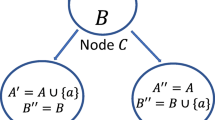Abstract
A heuristic procedure, called successive regression approximations (SRA) has been developed for solving stochastic programming problems. They range from equation solving to probabilistic constrained and two-stage models through a combined model of Prékopa. We show here, that due to enhancements in the computer program, SRA can be used to solve large-scale two-stage problems with 100 first stage decision variables and a 120 dimensional normally distributed random right hand side vector in the second stage problem. A FORTRAN source program and computational results for 124 problems are presented at www.uni-corvinus.hu/~ideak1.
Similar content being viewed by others
References
Deák, I. (2001a). Computer experiences with successive regression approximations for solving equations. In F. Gianessi, P. Pardalos, & T. Rapcsák (Eds.), Optimization theory (pp. 65–80). Dordrecht: Kluwer Academic.
Deák, I. (2001b). Successive regression approximations for solving equations. Pure Mathematics and Applications, 12, 25–50.
Deák, I. (2002a). Probabilities of simple n-dimensional sets in case of normal distribution. IIE Transactions on Operations Engineering, 34, 1–18.
Deák, I. (2002b). Computing two-stage stochastic programming problems by successive regression approximations. In K. Marti (Ed.), LNEMS. Vol. 513: Stochastic optimization techniques—numerical methods and technical applications (pp. 91–102). Berlin: Springer.
Deák, I. (2003). Solving stochastic programming problems by successive regression approximations—numerical results. In K. Marti, Yu. Ermoliev, & G. Pflug (Eds.), LNEMS. Vol. 532: Dynamic stochastic optimization (pp. 209–224). Berlin: Springer.
Deák, I. (2004). On Monte Carlo methods of stochastic programming. Dissertation for Doctor Academiae Scientiarum Hungaricae (pp. 178) (in Hungarian).
Deák, I. (2006). Two-stage stochastic problems with correlated normal variables: computational experiences. Annals of Operations Research, 142, 79–97.
Kall, P., & Wallace, S. W. (1994). Stochastic programming. New York: Wiley.
Linderoth, J., & Wright, S. (2002). Decomposition algorithms for stochastic programming on a computational grid (Optimization technical report 02-07). Computer Sciences Department, University of Wisconsin-Madison (p. 45).
Mak, W. K., Morton, D. P., & Wood, R. K. (1999). Monte Carlo bounding techniques for determining solution quality in stochastic programs. Operations Research Letters, 24, 47–56.
Mayer, J. (1998). Stochastic linear programming algorithms. New York: Gordon and Breach.
Mulvey, J. M., & Ruszczyński, A. (1995). A new scenario decomposition method for large scale stochastic optimization. Operations Research, 43, 477–490.
Prékopa, A. (1995). Stochastic programming. In Mathematics and its applications (Vol. 324). Dordrecht: Kluwer.
Ruszczyński, A., & Shapiro, A. (eds.) (2003). Stochastic programming. Handbook of stochastic programming (Vol. 10). Amsterdam: Elsevier.
Ruszczyński, A., & Świętanowski, A. (1997). Accelerating the regularized decomposition method for two-stage stochastic linear problems. European Journal of Operational Research, 101, 328–342.
Sen, S., Doverspike, R. D., & Cosares, S. (1994). Network planning with random demand. Telecommunications Systems, 3, 11–30.
Author information
Authors and Affiliations
Corresponding author
Additional information
Research supported by National Scientific Research Fund (Hungary), grant T047340.
Rights and permissions
About this article
Cite this article
Deák, I. Testing successive regression approximations by large-scale two-stage problems. Ann Oper Res 186, 83–99 (2011). https://doi.org/10.1007/s10479-009-0602-8
Published:
Issue Date:
DOI: https://doi.org/10.1007/s10479-009-0602-8




